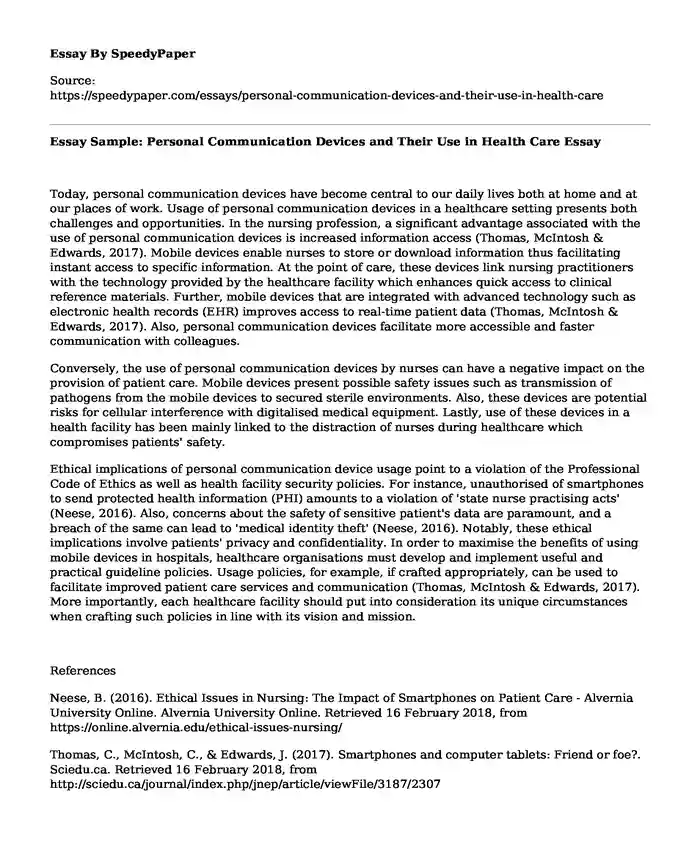
| Type of paper: | Course work |
| Categories: | Technology Healthcare |
| Pages: | 2 |
| Wordcount: | 416 words |
Today, personal communication devices have become central to our daily lives both at home and at our places of work. Usage of personal communication devices in a healthcare setting presents both challenges and opportunities. In the nursing profession, a significant advantage associated with the use of personal communication devices is increased information access (Thomas, McIntosh & Edwards, 2017). Mobile devices enable nurses to store or download information thus facilitating instant access to specific information. At the point of care, these devices link nursing practitioners with the technology provided by the healthcare facility which enhances quick access to clinical reference materials. Further, mobile devices that are integrated with advanced technology such as electronic health records (EHR) improves access to real-time patient data (Thomas, McIntosh & Edwards, 2017). Also, personal communication devices facilitate more accessible and faster communication with colleagues.
Conversely, the use of personal communication devices by nurses can have a negative impact on the provision of patient care. Mobile devices present possible safety issues such as transmission of pathogens from the mobile devices to secured sterile environments. Also, these devices are potential risks for cellular interference with digitalised medical equipment. Lastly, use of these devices in a health facility has been mainly linked to the distraction of nurses during healthcare which compromises patients' safety.
Ethical implications of personal communication device usage point to a violation of the Professional Code of Ethics as well as health facility security policies. For instance, unauthorised of smartphones to send protected health information (PHI) amounts to a violation of 'state nurse practising acts' (Neese, 2016). Also, concerns about the safety of sensitive patient's data are paramount, and a breach of the same can lead to 'medical identity theft' (Neese, 2016). Notably, these ethical implications involve patients' privacy and confidentiality. In order to maximise the benefits of using mobile devices in hospitals, healthcare organisations must develop and implement useful and practical guideline policies. Usage policies, for example, if crafted appropriately, can be used to facilitate improved patient care services and communication (Thomas, McIntosh & Edwards, 2017). More importantly, each healthcare facility should put into consideration its unique circumstances when crafting such policies in line with its vision and mission.
References
Neese, B. (2016). Ethical Issues in Nursing: The Impact of Smartphones on Patient Care - Alvernia University Online. Alvernia University Online. Retrieved 16 February 2018, from https://online.alvernia.edu/ethical-issues-nursing/
Thomas, C., McIntosh, C., & Edwards, J. (2017). Smartphones and computer tablets: Friend or foe?. Sciedu.ca. Retrieved 16 February 2018, from http://sciedu.ca/journal/index.php/jnep/article/viewFile/3187/2307
Cite this page
Essay Sample: Personal Communication Devices and Their Use in Health Care. (2022, Mar 11). Retrieved from https://speedypaper.com/essays/personal-communication-devices-and-their-use-in-health-care
Request Removal
If you are the original author of this essay and no longer wish to have it published on the SpeedyPaper website, please click below to request its removal:
- Diversity in Education, Essay Sample
- Heat Transfer, Free Essay in Chemistry
- Essay Sample on Beowulf: The Battle with Grendel
- What Happens To The Brain During Depression - Essay Sample
- Free Essay. Analytical Essay of Lead Female Character of The Movie Hyenas
- Free Essay Sample. Description of Europe
- Meningococcal B Vaccine: Preventing Intrusive IMD Outbreak - Essay Sample
Popular categories




